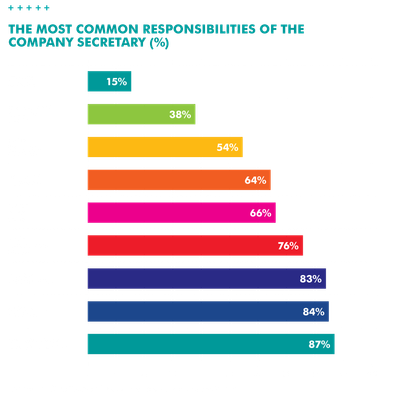White Paper
Company Secretaries:
COMPANY SECRETARIES:
Keeping boards above board
The rarely discussed role of company secretaries in board succession planning


Data source: Grant Thornton: Is the role of company secretary fit for the future?
Effective board succession planning requires strategic alignment, governance oversight, and a long-term vision. There are many key roles within an organisation that are vital to ensure that board transitions are well-structured, transparent, and aligned with corporate objectives. Key players in the process include the Chair, CEO, CHRO and CFO, but a less discussed process driver is the Company Secretary.
WHY THE COMPANY SECRETARY IS CRITICAL TO SUCCESSION PLANNING
1. Governance & Compliance Expertise
The Company Secretary ensures that succession planning aligns with corporate governance codes, legal requirements, and regulatory frameworks. They manage director appointments in accordance with company law, stock exchange rules, and board charters.
2. Board Dynamics & Independence
The Company Secretary works closely with the board and understands boardroom culture, director relationships, and long-term governance needs.
3. Regulatory & Shareholder Liaison
They act as a bridge between the board, regulators and shareholders, ensuring that board appointments meet transparency, disclosure and governance requirements. They assist with ESG frameworks and reporting as well as non-financial annual reporting.
4. Objectivity & Neutrality
They are a neutral, independent advisor who ensures that board appointments are made based on merit, governance needs and best practices. They have a unique helicopter view of the whole organisation.
5. Structured Board Succession Framework
The Company Secretary develops and maintains a formal, well-documented board succession plan that ensures leadership continuity while considering corporate strategy and risk management.

WHEN TO INVOLVE THE CFO, CHAIR, CEO, & CHRO?
While the Company Secretary plays a vital role in driving the process, the wider c-suite are needed for their expertise:
- CFO Provides input into the financial expertise required on the board.
- Chairperson Ensures alignment with strategic leadership needs.
- CEO Advises on executive succession and potential board candidates from within the organisation.
- CHRO Identifies internal executive candidates, advises on leadership skills and diversity, and supports onboarding of new board members.
The Company Secretary ensures that board succession planning is strategic, compliant, and transparent, while the CFO, Chairperson, CEO, and CHRO play supporting roles in their respective areas of expertise. While all contribute to the process, the Company Secretary drives and ensures, neutrality, governance integrity, and regulatory compliance.
Wilbury Stratton works with a global network of Company Secretaries and provides quality talent research and insights to support board succession planning.



